For those who don’t know, our skin sheds more than 40,000 skin cells each day. Since it’s the biggest organ of our body, our skin is a protective barrier that constantly replenishes itself. Using the right skincare tips for nourishment, care, and protection will help you slow down signs of ageing, reduce acne, and achieve healthier and nourished skin. While everyone's skincare needs are different, dermatologists frequently emphasise certain fundamental suggestions for preserving healthy skin. In this blog, we'll look at skincare tips that physicians frequently offer.
Some skincare tips for men and women
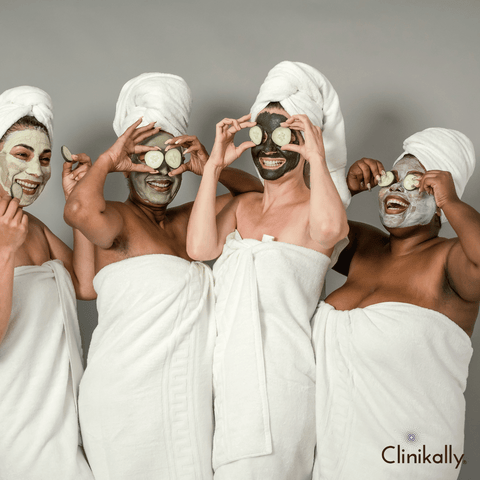
Healthy lifestyle choices and excellent skin choices can help stop different skin issues and delay the natural ageing of the skin. You can follow a few simple skincare tips for men and women that will help you enjoy healthy, glowing, and even-toned skin throughout the year.
-
Incorporate fatty acids into your routine. For those who don’t know, our skin utilizes omega-fatty acids to create lipids. These are the natural oils that moisturize our skin. According to studies, supplements for skin that contain omega-3 help improve the hydration and lipid levels of our skin.
-
Vitamin C is your friend! Within 6 months of noticing a dark spot, try to reduce dark spots by using a doctor-recommended pigmentation cream or Vitamin C serum. If you ignore dark spots, they will be more difficult to remove in the future. But avoid using a Vitamin C serum on acne-prone skin.
-
Sun damage can cause fine lines. Did you know that 90% of fine lines are a result of constant exposure to the sun? Even if it’s the cold months, you still have to follow skincare tips for winter if you want to avoid fine lines. Because of this, sunscreen is one of the best tools you can have to achieve younger-looking skin. Every day, make sure you use sunscreen with SPF 30 or more.
-
Take time when applying skincare products. Whenever you layer products, allow them 2-3 minutes to absorb. Doing so will help you avoid diluting them by the next product you put on.
-
Tackle dry skin at night. If you wake up with dry skin, consider changing your skincare routine at night. Don’t change your morning routine - it is a lot simpler to prevent dryness at night than to fix it the next day.
What do experts say about skincare tips?

Almost every person out there wants a natural glow on their skin. But for a lot of people, getting glowing skin appears like an impossible task, even after utilising tons of skin treatments, facials, skincare products, etc.
As per dermatologists, the glow of your skin has a lot to do with the type of lifestyle you live. Because of this, it’s always ideal to use skincare tips for women from expert dermatologists. Thus, following a personalized skincare routine based on your needs and skin type will bring the best results.
When it comes to skincare, experts such as dermatologists and skincare professionals emphasise several crucial elements. While individual recommendations may vary depending on specific skin concerns, here are some common insights from skincare experts: Consistency is key, sun protection is non-negotiable, tailor your routine to your skin type, gentle cleansing is essential, moisturise regardless of skin type, avoid harsh ingredients, regular exfoliation is important, hydration comes from within and without, individualization of skincare, and seeking professional advice. A dermatologist should be consulted for personalised suggestions based on your skin's individual needs and concerns.
Why is a healthy skincare routine so important?
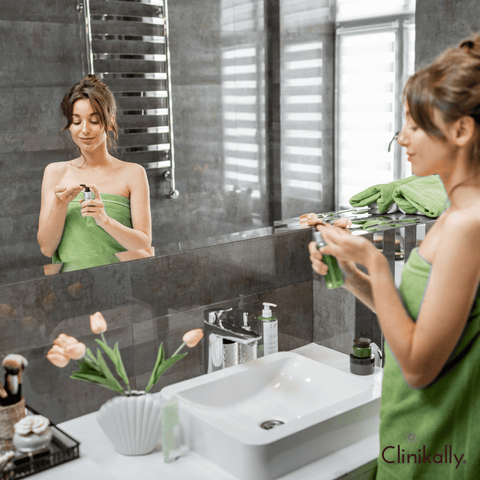
A lot of people out there wonder if having a good skincare routine can help them achieve younger-looking skin. Well, the simple answer is yes. It helps a lot to have a healthy skincare routine. However, taking good care of your skin isn’t just about getting beautiful skin. Since it’s the biggest organ you have, your skin also affects your health.
If you take care of your skin with a healthy routine, it can help take care of you. This is the main reason why it’s so vital to have a healthy skincare routine. It’s always worth the effort and time to take care of your skin every single day.
A good skincare routine is important for various reasons, including the overall health and appearance of your skin. Protection against environmental damage, prevention of skin issues, promotion of healthy ageing, maintenance of skin barrier function, even skin tone and texture, prevention of sun damage, boosted confidence and well-being, early detection of skin issues, customization for individual needs, and prevention of long-term damage are some of the key reasons why maintaining a good skincare routine is important. It's an investment in your long-term skin health and can help you feel better in general.
Do skincare products really work?
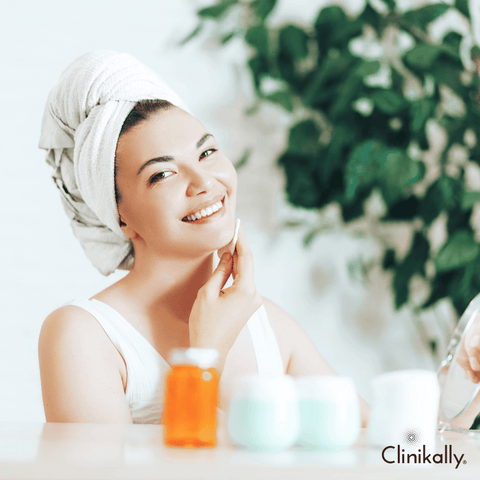
Skincare products can definitely be incorporated into your normal skincare routine for faster and more effective results! In fact, many skincare experts recommend using a mix of skincare products to target specific problem areas - in the form of a personalised treatment plan!
For example, if you are struggling with acne, you might want to use a spot-reduction treatment in addition to your regular cleanser and moisturiser. On the other hand, if you have dry skin, using a serum or face oil, such as a Niacinamide serum for the face, will help.
Pro tip: Dermatologists recommend that you use hair and skin care products carefully based on your skin type, concerns, and other factors, such as pregnancy. This will help you get healthy skin in the safest and most effective manner.
Here are some key points to consider when evaluating the efficacy of skincare products:
-
Ingredients Matter: The ingredients of a skincare product are frequently linked to its effectiveness. Retinoids, antioxidants, hyaluronic acid, and peptides have all been scientifically demonstrated to provide skincare advantages.
-
Consistency is Crucial: Skincare products must be used consistently over time to provide apparent results. Overnight transformations are uncommon, and it generally takes weeks, if not months, to reap the full advantages of particular products.
-
Individual Variability: Skin types differ, and what works for one individual may not work for another. Genetics, lifestyle, and environmental influences can all have an impact on how effectively a skincare product works for an individual.
-
Addressing Specific Concerns: Different products address different skincare concerns. Retinoids, for example, are well-known for their anti-aging properties, while salicylic acid is beneficial for acne-prone skin. Using goods that address your unique issues can boost their effectiveness.
-
Professional Guidance: Dermatologists can give you personalised advice based on your skin type and problems. Seeking professional assistance can assist you in selecting goods that are more likely to be beneficial for your specific requirements.
-
Research and Reviews: It can be beneficial to examine the ingredients and read reviews from people who have similar skin conditions before choosing a skincare product. Individual experiences may differ, so it's important to approach reviews with an open mind.
-
Patience is Key: Skincare is a lengthy process. Patience is essential, since certain products may take some time to produce benefits. If you stop using a product abruptly due to a perceived lack of results, you may miss out on all of its benefits.
-
Combination Approach: Combining products that complement one another can increase their effectiveness. For example, combining a cleanser, moisturiser, and sunscreen can result in a well-rounded routine.
-
Quality Matters: Skincare product quality can vary. Higher-quality goods frequently contain more concentrated and stable formulations of active substances, which may result in improved results.
-
Lifestyle Factors: Skincare is more than just products; lifestyle aspects such as a nutritious diet, proper sleep, and sun protection are all important in maintaining healthy skin.
5 effective skincare tips (and how to practise them!)
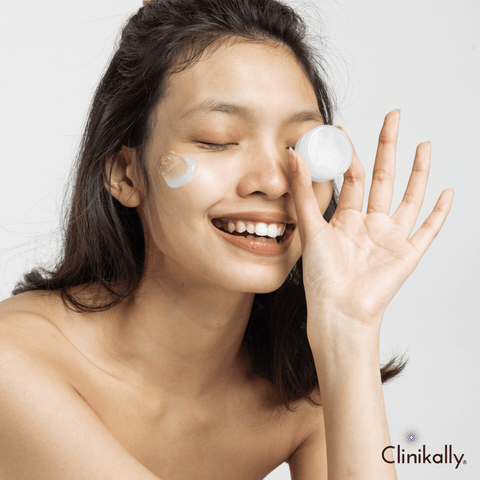
Every person wants flawless and glowing skin. However, it’s a bit difficult to achieve, keeping in mind genetics, pollution, and the stress of everyday life. Moreover, having skin conditions such as acne, pigmentation, or dry skin can make it even harder. Here are 5 effective skincare tips for girls and boys that you can follow to achieve healthy skin without spending too much money!
#1 Use home remedies for healthy skin
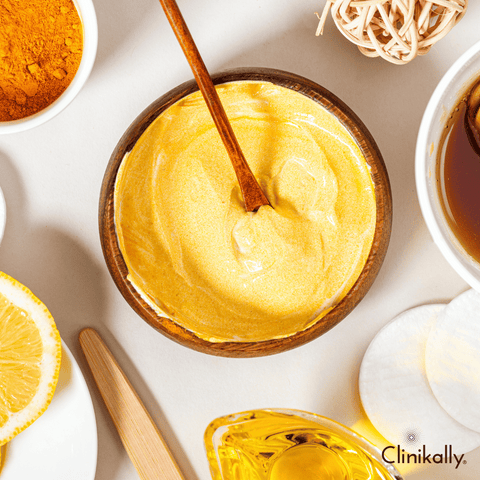
We’ve mentioned this a lot of times. Your skin is the biggest organ in your body. As much as possible, you need to take care of it. Usually, glowing skin is seen as an indication of vitality and health. On the other hand, dry or dull skin can usually make you feel less than your best.
Just make sure that the home remedies or skincare tips that you follow are from a trusted health platform, or from a dermatologist. In this way, you can try out home remedies for acne, and even hair care tips to prevent hair fall that will bring effective results using only the things you already have at home! Simply ensure you choose tips that suit the type of skin you have.
Here are some common home remedies that you can incorporate into your skincare routine:
-
Honey for Moisture and Healing: Apply raw honey to your face and let on for 15-20 minutes before rinsing with warm water. Honey contains natural humectants, which help to moisturise the skin and aid healing.
-
Oatmeal for Soothing Irritated Skin: Mix oats with water or milk to make an oatmeal mask. Apply the paste to your face and leave it on for 15-20 minutes before rinsing. The oatmeal can be used to treat irritated or inflammatory skin.
-
Yogurt for Exfoliation and Brightening: Apply plain yoghurt with a teaspoon of honey to your face. Allow it to sit for 15-20 minutes before rinsing. Lactic acid in yoghurt acts as a gentle exfoliation and can help brighten the skin.
-
Aloe Vera for Sunburn and Inflammation: Apply fresh aloe vera gel to burnt or irritated skin. Aloe vera has anti-inflammatory and cooling qualities that can relieve skin irritation.
-
Coconut Oil for Moisturizing: Apply a small amount of coconut oil to your skin and gently massage it in. Coconut oil is high in fatty acids, making it an excellent natural moisturiser for improving skin moisture.
-
Green Tea for Antioxidant Protection: Allow green tea to cool after brewing. Using a cotton ball, apply the cooled tea to your face. Green tea contains a high concentration of antioxidants, which can help protect the skin from harm.
-
Cucumber for Puffy Eyes: For around 10 minutes, place chilled cucumber slices on your eyes. Cucumbers are cooling and can help with puffiness and dark circles.
-
Turmeric for Anti-Inflammatory Effects: Apply a paste made of turmeric, water, or yoghurt to your face. Allow it to sit for 10-15 minutes before rinsing. Turmeric possesses anti-inflammatory qualities that may be beneficial to the skin.
-
Lemon for Brightening: Apply fresh lemon juice and equal parts water to your face using a cotton ball. Lemon has natural exfoliating capabilities and can aid in face brightening. However, if you have sensitive skin, avoid using lemon juice because it can irritate it.
-
Rosewater for Hydration: After cleansing, spritz rosewater on your face as a delightful mist or use it as a toner. Rosewater can help moisturise and balance the pH of the skin.
Before using any home cure, patch-test the item on a small area of your skin to ensure there is no adverse reaction. Furthermore, if you have specific skin issues or disorders, you should seek personalised advice and treatment from a dermatologist.
#2 Practise a personalised skincare routine
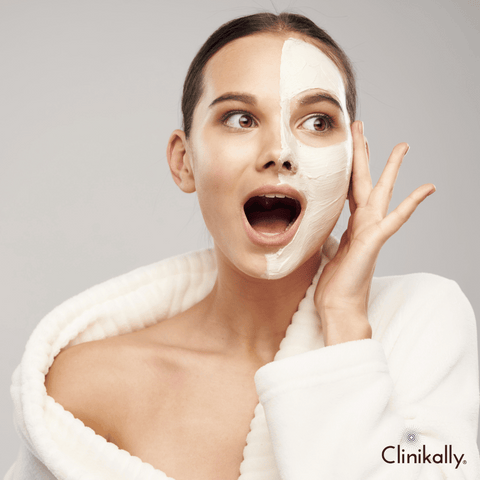
If you think that having excellent skin is a matter of having perfect genes, you’re wrong. The truth is that your daily habits have a huge influence on what you see in the mirror.
It helps to make skincare a habit. Don’t just take care of your skin if you’re attending a special event the next day. Even if you’re just going to stay at home the entire day, you still have to take care of your skin. That is why it’s called a routine. You have to follow it every day if you want to achieve the skin that you desire.
It is always early enough to start a skincare routine. Even kids can follow a healthy skincare routine by simply washing their faces before bed and applying sunscreen when going out. When planning your skincare routine, just make sure you choose particular products or steps that fit your age and skin type.
#3 Use doctor-recommended skincare products

Selecting the right skincare routine can be extremely stressful. It’s a bit soul-crushing, expensive, overwhelming, and time-consuming. To make it easy, you can use doctor-recommended skincare products as per your skin type and concerns.
You can find the best skincare products in India that have been recommended by the best dermatologists in India on Clinikally - to enjoy healthy skin while staying worry-free!
Doctor-recommended skincare products are frequently selected based on scientific facts, proven effectiveness, and particular skin demands. Consultation with a dermatologist, cleanser, moisturiser, sunscreen, targeted treatments, following usage instructions, consistency is crucial, modifications based on feedback, a nightly routine, and regular follow-ups are some general guidelines for using doctor-recommended skincare products. Depending on how your skin reacts, your dermatologist may need to modify your routine. If you have any issues or queries regarding your skincare routine, you should seek expert advice from your dermatologist.
#4 Follow safe skincare during pregnancy

As a woman, one of the most beautiful phases of your life is pregnancy. Unfortunately, during those 9 months, women also go through tons of changes. Some of these changes are hormonal changes that can result in skin concerns such as pigmentation, itchy skin, and acne breakouts - which can be treated with dermatologist-recommended skincare products.
To prevent such skin issues during pregnancy, it’s important to follow a skincare routine. Luckily, there are a lot of expert tips for healthy skin during pregnancy. You can always follow the skincare tips given by your skin specialist or dermatologist to retain healthy and glowing skin during pregnancy. Here are some tips for safe skincare during pregnancy:
-
Consult Your Healthcare Provider: Before introducing new skincare products or making any changes to your routine, always consult with your healthcare professional. Certain foods should be avoided when pregnant.
-
Avoid Harmful Ingredients: Avoid retinoids (such as Retin-A), salicylic acid in excessive doses, and benzoyl peroxide in skincare products. These ingredients should be avoided when pregnant.
-
Choose Pregnancy-Safe Products: Choose skincare products that are labelled as pregnancy-safe or that have been specially developed for use during pregnancy. These products are usually free of chemicals that could be harmful at this time.
-
Sunscreen is a Must: To protect your skin from the sun's harmful UV rays, continue to use a broad-spectrum sunscreen with at least SPF 30. Look for formulas that are safe to use throughout pregnancy.
-
Hydrate Your Skin: Use a mild, fragrance-free moisturiser to keep your skin nourished. This can assist with dryness, which is a typical issue during pregnancy.
-
Deal with Pregnancy Acne Safely: If you have pregnancy-related acne, use moderate cleansers and non-comedogenic products. Before using any acne remedies, check with your doctor because some common chemicals may be unsafe during pregnancy.
-
Be Cautious with Essential Oils: While some essential oils are usually thought to be safe during pregnancy, others may be harmful. Consult your healthcare physician before using essential oils, and use them sparingly if at all.
-
Read Labels: Examine the ingredient labels of skincare products carefully. Choose products with simple, safe formulations over those with doubtful or unusual components.
-
Minimise Fragrance: During pregnancy, some women may become more sensitive to scents. To lessen the risk of skin irritation, choose fragrance-free or hypoallergenic products.
-
Stay Hydrated: Drink plenty of water to stay hydrated, which improves skin health overall.
Consult your healthcare practitioner or a dermatologist if you have specific skin issues or questions regarding your pregnancy skincare routine. They can give you personalised counsel depending on your specific situation.
#5 Never forget your sunscreen!
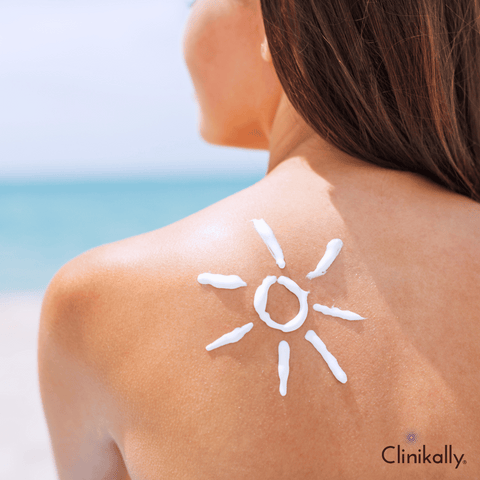
Sunscreens are one of the essential parts of every skincare routine. Dermatologists recommend applying sunscreen every time before stepping out. The ideal application of sunscreen should be indoors as well.
Wearing sunscreen protects you from UVA and UVB rays of the sun, which can otherwise cause skin damage and tanning, and lead to wrinkles, fine lines, and even skin cancer. The right sunscreen will also protect your skin against Infrared and Blue Light. Clinikally's Sunscreen SPF 50/PA+++ means that it will not only protect your skin against both UVA and UVB rays of the sun but also against Blue Light and Infrared.
Sunscreen protects against the sun's damaging ultraviolet (UV) radiation, and frequent use is connected with several skin health benefits. Here are some of the reasons why sunscreen is so important:
-
Prevention of Skin Cancer: Prolonged exposure to UV light is a leading cause of skin cancer. Sunscreen helps to minimise the risk of skin cancers such as melanoma, basal cell carcinoma, and squamous cell carcinoma.
-
Protection Against Premature Aging: UV rays can hasten skin ageing by causing wrinkles, fine lines, and age spots. Sunscreen protects the skin from these damaging rays, preventing premature ageing.
-
Reduction of Sunburns: Sunburns are not only painful, but they can also be harmful to your skin in the long run. Sunscreen acts as a barrier, preventing sunburn, especially when exposed to the sun for an extended period of time.
-
Prevention of Hyperpigmentation: Sun exposure can result in hyperpigmentation, which is characterised by dark areas and uneven skin tone. The use of sunscreen on a daily basis aids in the prevention and treatment of these diseases.
-
Protection Against UV-Induced Skin Diseases: UV radiation can aggravate certain skin conditions, such as rosacea and eczema. By functioning as a protective barrier, sunscreen aids in the management of various illnesses.
-
Maintenance of Skin Health: Sunscreen promotes overall skin health by protecting the skin's natural barrier and reducing the danger of environmental damage.
Remember that including sunscreen in your daily skincare routine is a simple yet effective strategy to protect your skin and support long-term skin health.
Simplify your daily skincare routine
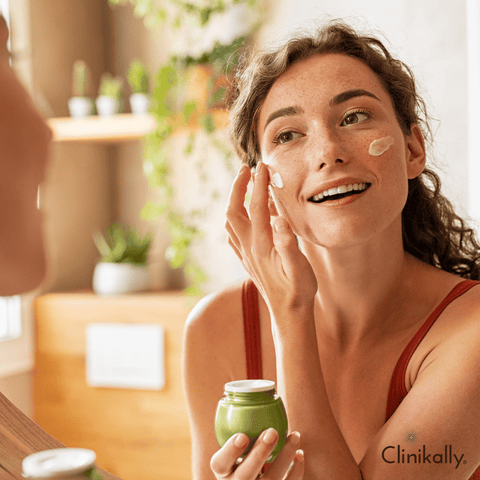
Skincare can be overwhelming - especially if you do it right! Since there are too many skin oils, toners, cleansers, lotions, or serums out there, it can be worrisome. Here's a simplified daily skincare routine that includes all of the necessary steps for healthy skin:
Morning Routine:
-
Cleanser: Use a gentle cleanser suitable for your skin type to remove any oil or impurities that may have accumulated overnight.
-
Moisturizer: Apply a lightweight, hydrating moisturiser to keep your skin moisturised throughout the day.
-
Sunscreen: Use a broad-spectrum sunscreen with an SPF of at least 30. Apply it liberally to all exposed skin, including your face, neck, and hands.
Evening Routine:
-
Cleanser: Cleansing your face will remove any makeup, toxins, or dirt buildup from the day.
-
Moisturizer: If you want your skin to heal and remain hydrated overnight, use a moisturiser that is a little bit more nourishing in the evening.
Additional Steps (2-3 Times a Week):
-
Exfoliation: Exfoliate your skin two to three times a week to get rid of dead skin cells. Use an exfoliant that is gentle enough for your skin type.
-
Treatment (If Needed): If you have specific skincare concerns, such as acne or ageing signs, consult your dermatologist before using targeted treatments.
Tips for Simplifying:
-
Multi-Functional Products: Choose multi-purpose products, such as a moisturiser with sunscreen or a cleanser that also exfoliates.
-
Keep It Minimal: Focus on the fundamentals. You do not need a slew of products to maintain healthy skin.
-
Listen to Your Skin: Take note of how your skin reacts. Consider reducing or changing your routine if a product seems too heavy or causes irritation.
-
Consistency Matters: Consistency is the key to any skincare practise. Stick to your programme for a few weeks to give your skin time to adjust and show improvements.
-
Consult a Professional: Consult a dermatologist if you have specific concerns or skin issues. They can provide you personalised guidance on how to streamline your routine while still meeting your specific demands.
Using dermatologist-recommended skincare tips or products will help you find the desired results. To find the best skincare routine for your skin type, make sure you follow tips only from the experts.
#6 Hair care is just as important!
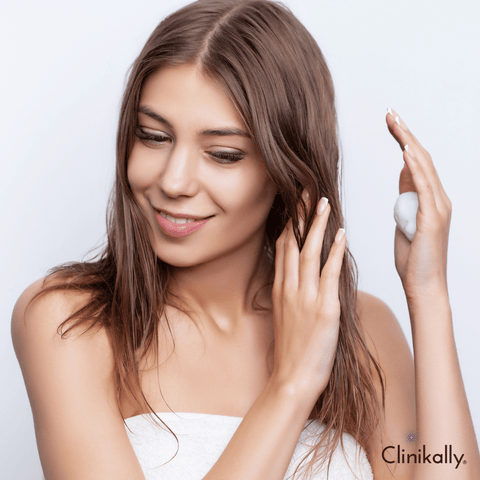
Skincare routines help a lot - that's for sure! But it's crucial to pay attention to your hair care routine as well, regardless of what style of hair or which type of scalp you have. The scalp is just another extension of your skin. Your scalp has thousands of hair follicles that need proper care and nourishment so that you can have thicker, fuller, and stronger hair. If you are facing hair fall, then you can make use of some home remedies for hair fall for both men and women that will help you prevent hair loss. Here are some tips for good hair care:
-
Washing Your Hair Regularly: Use a mild shampoo that is appropriate for your hair type when washing your hair. Washing 2-3 times per week is sufficient for many people, but the frequency can vary depending on individual needs.
-
Conditioning: Apply conditioner to your hair to keep it hydrated and smooth. Your hair's ends, which are typically drier, should receive the most of this product. Consider using a deep conditioning treatment once a week for extra nourishment.
-
Protect Your Hair from Heat: Avoid using heated styling products like flat irons and curling irons. To avoid damage, use a heat protectant spray when using them.
-
Gentle Drying: Wet hair is more prone to breaking, so pat it dry with a soft towel rather than rubbing it aggressively. When drying your hair, choose a cool or warm setting rather than high heat.
-
Steer Clear of Tight Hairstyles: Tight ponytails and braids are examples of hairstyles that should be avoided because they can eventually break and damage the hair.
-
Trim Frequently: To avoid split ends and preserve the general health of your hair, get haircuts on a regular basis. Trimming should be done every 6–8 weeks as recommended.
-
Sun Protection for Hair: The UV rays of the sun can cause damage to hair just like they can to skin. If you plan to spend a lot of time in the sun, think about donning a hat to shield your hair.
-
Choose Hair Products Wisely: Shampoos, conditioners, and styling products should be chosen depending on your hair type and unique needs. Consider sulfate-free alternatives for a kinder cleansing.
-
Stay Hydrated and Eat a Balanced Diet: Proper hydration and a well-balanced diet help to maintain the health of your hair. Water and nutrients such as vitamins A, C, and E, as well as biotin and omega-3 fatty acids, can help stimulate healthy hair development.
-
Manage Stress: Stress can cause hair loss and other hair-related problems. To promote overall well-being, engage in stress-relieving activities such as exercise, meditation, or yoga.
-
Consider Your Hair Type: Different hair types (straight, wavy, curly, or coily) have different requirements. Make your hair care routine specific to your hair type.
Keep in mind that hair care is very personal, and what works for one person may not work for another. Pay attention to how your hair reacts to various products and treatments, and adjust your routine as needed. If you have specific concerns about the health of your hair or scalp, consult with a professional stylist or a dermatologist.
#7 Consult a dermatologist in case of doubts

Are you in doubt about your current skincare routine? Do you think it’s not giving you the results that you wanted? Well, if that’s the case, you can always consult a dermatologist.
Lucky for you, you don’t have to travel to the nearest office in your area. If you’ve got a mobile device, laptop, or computer and an internet connection, you can also go for a quick and easy online dermatologist consultation, and get expert advice or personalised treatment plans from the comfort of your home.
Dermatologists are medical professionals who specialise in treating conditions related to the skin, hair, and nails. Here are some situations in which seeking advice from a dermatologist is beneficial:
-
Persistent Skin Issues: A dermatologist can give a diagnosis and propose effective treatments if you have skin concerns such as persistent acne, eczema, psoriasis, or other skin conditions that do not improve with over-the-counter remedies.
-
Skin Cancer Screening: Skin cancer tests should be done on a regular basis, especially if you have a history of extensive sun exposure or if you observe changes in moles or other skin lesions. Dermatologists are specially educated to detect and treat skin cancer.
-
Hair and Scalp Problems: A dermatologist can help establish the source of hair loss, scalp concerns, or conditions like alopecia and offer appropriate therapies.
-
Unexplained Rashes or Irritations: If you have unexplained rashes, redness, or irritations on your skin, a dermatologist can examine the problem and provide appropriate treatment.
-
Persistent Acne or Acne Scarring: Dermatologists can provide advanced treatments for acne that is persistent or scarring that requires professional involvement.
-
Allergic Reactions: If you feel you've had an adverse reaction to a skincare or haircare product, a dermatologist can identify the allergen and prescribe suitable alternatives.
-
Cosmetic Concerns: A dermatologist can address cosmetic issues such as wrinkles, fine lines, and age spots using a variety of treatments such as injectables, laser therapy, or prescription-strength skincare.
-
Customised Skincare Recommendations: Dermatologists can examine your skin type, listen to your problems, and make customised skincare suggestions based on your specific needs.
-
Preventive Skin Care: Even if you have no specific concerns, a dermatologist can advise you on preventive skincare and prescribe products and routines that are appropriate for your skin type.
-
Professional Advice for Skin Procedures: Consulting a dermatologist before undergoing skin procedures such as chemical peels, microdermabrasion, or laser treatments ensures that these procedures are conducted safely and successfully.
The impact of diet and nutrition on skin health
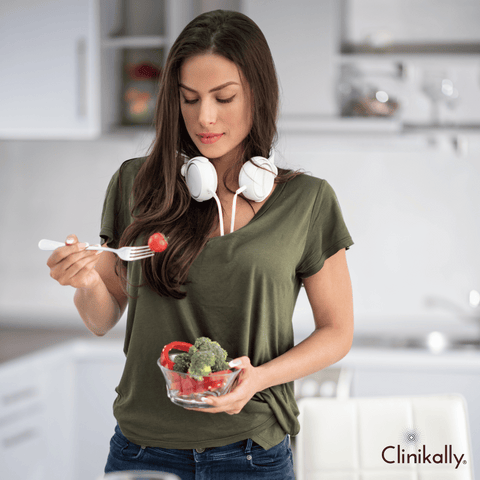
Diet and nutrition play an important part in general health and can have an impact on the health and appearance of your skin. Here are some examples of how diet and nutrition affect skin health:
-
Hydration: Staying hydrated is essential for skin health. Water aids in the removal of toxins from the body and keeps the skin hydrated, resulting in a plump and beautiful complexion.
-
Essential Nutrients: Vitamins, minerals, and antioxidants are all necessary for skin health. Vitamin C, Vitamin E, Vitamin A, and Omega-3 Fatty Acids are a few examples.
-
Collagen Formation: Collagen is a protein that gives the skin structure. Consuming amino acid-rich diets, such as those found in lean proteins, promotes collagen synthesis and keeps the skin tight and smooth.
-
Antioxidant Protection: Fruits and vegetables include antioxidants that help protect the skin from free radicals, which can lead to premature ageing. Antioxidants are abundant in colourful fruits and vegetables, such as berries, spinach, and carrots.
-
Healthy Fats: Including healthy fats in your diet, such as those found in avocados, olive oil, and almonds, can help keep your skin hydrated and smooth.
-
Sun Protection from Within: Certain minerals, such as beta-carotene present in orange and yellow fruits and vegetables, can offer some UV protection and contribute to a healthy glow.
-
Reducing Inflammatory Foods: Some foods can cause inflammation, which can aggravate skin problems like acne and psoriasis. Limiting processed foods, sugary snacks, and excessive dairy consumption may aid in the reduction of inflammation.
-
Gut Health: Skin health is connected to a healthy gut microbiome. Probiotics contained in fermented foods such as yoghurt and kefir can help maintain healthy gut microbiota.
-
Collagen Supplements: Collagen supplements, which are frequently obtained from animal or marine sources, are widely used to promote skin flexibility and moisture. However, the scientific evidence for their effectiveness is still being studied.
-
Moderation and Balance: A well-balanced, diversified diet rich in nutrients is essential. Avoiding extremes, such as calorie restriction or overconsumption of a particular nutrient, promotes overall health, including skin health.
While diet and nutrition are crucial, it's important to remember that everyone's reactions are different. A holistic approach to skincare also includes aspects like sun protection, a healthy skincare routine, and lifestyle choices. If you have specific skin or dietary concerns, seek personalised advice from a healthcare practitioner or a trained dietician.
Foods to include for a radiant complexion

Nutrient-rich foods can help you achieve a bright complexion by supplying necessary vitamins, minerals, and antioxidants that promote skin health. Fruits and vegetables, fatty fish, nuts and seeds, avocado, sweet potatoes, tomatoes, green tea, broccoli, greek yoghurt, dark chocolate, watermelon, and papaya are some items to consider including in your diet for a bright complexion. Individual responses to dietary changes can also vary, so listen to your body and speak with a healthcare expert if you have specific concerns.
How hydration affects skin appearance

Hydration is an important component that has a considerable impact on the appearance and health of the skin. Hydration is essential for preserving the skin's elasticity, suppleness, and overall radiance. Here's how hydration impacts skin appearance:
-
Moisture Balance: Skin that is well-hydrated maintains a good moisture balance. Skin that is properly hydrated appears plump, smooth, and healthy. Dehydrated skin, on the other hand, may appear dull and dry, with more visible fine lines and wrinkles.
-
Reduced Dryness and Flakiness: Dehydrated skin is prone to flakiness and dryness. Proper hydration aids in the prevention of these disorders, leaving the skin smoother and more even-toned.
-
Minimization of Fine Lines and Wrinkles: Skin that is properly moisturised is less likely to develop fine lines and wrinkles. Dehydrated skin can make existing lines appear more prominent, but well-hydrated skin appears more youthful and plump.
-
Radiant Complexion: Hydrated skin reflects light more effectively, resulting in a more radiant complexion. Dehydrated skin may appear dull and may not reflect light as well.
-
Improved Elasticity: Hydration promotes skin elasticity, which is essential for retaining firmness and avoiding sagging. Skin that is well-hydrated is more resilient and bounces back from motions, resulting in a more youthful appearance.
-
Reduction of Inflammation: Skin that is dehydrated may be more prone to inflammation, redness, and irritation. Proper hydration soothes the skin and reduces irritation, resulting in a more even and tranquil complexion.
-
Enhanced Absorption of Skincare Products: Hydrated skin absorbs skincare products more effectively. When the skin is properly moisturised, the active compounds in serums, creams, and other skincare products may be absorbed and utilised more effectively.
-
Balanced Oil Production: Dehydrated skin may compensate by producing extra oil, resulting in acne and outbreaks. Proper hydration balances oil production, resulting in brighter, healthier-looking skin.
-
Supports Skin Barrier Function: The stratum corneum, the skin's outermost layer, serves as a barrier against environmental stresses. Hydration is essential for maintaining the barrier's integrity, minimising water loss, and keeping irritants out.
-
Prevention of Premature Aging: Skin that is well-hydrated is more resistant to the indications of premature aging. Adequate hydration protects the skin from environmental harm and promotes the skin's natural repair processes.
To keep your skin hydrated, drink plenty of water, use hydrating skincare products, and consider environmental factors like humidity. Furthermore, lifestyle factors such as a balanced diet, adequate sleep, and avoiding excessive sun exposure all contribute to overall skin health and appearance.
































